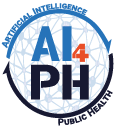The Artificial Intelligence for Public Health training programme is a specialization of the Master’s degree in Public Health (training officers: Pr Stéphanie Gentile, Pr Roch Giorgi). The specialization AI4PH (“research” specialization, training officers: Dr Jean-Charles Dufour, Pr Roch Giorgi) is taught entirely at distance.
General aims
The research specialization “Artificial Intelligence for Public Health” (AI4PH) of the Master of Public Health aims to train students in research in artificial intelligence methods for public health. The application of artificial intelligence -AI- to medicine can contribute to the improvement of population health. This intensive master’s course focuses on the challenges, needs, implications, applications and methods of artificial intelligence for public health. Designed with a transdisciplinary and interdisciplinary approach, it will allow the students to acquire knowledge in the field of artificial intelligence applied to public health, by combining algorithmic and modelling knowledge with contextualised understanding, critical thinking and the social, societal and ethical dimension. The specific and transversal skills thus acquired in this research specialization should enable students to apply for a university thesis and to take part in methodological and interdisciplinary research using artificial intelligence methods.
Employment opportunities
The opportunities for this research training are very broad and concern the professions of artificial intelligence in the field of health. For example, they can be researchers, teacher-researchers, research engineers, study engineers in public structures (universities, hospitals, INSERM, CNRS, IRD, etc.) or private structures (pharmaceutical industries, private research institutes, etc.).
Admission requirements
- This master is taught entirely at distance.
- The courses are held live courses via the Internet.
- This master is open to students from any nationality and from various backgrounds.
This Master’s programme is open to initial training:
- Students who have obtained a scientific M2 or M1, an engineering school diploma or a diploma considered equivalent by the teaching staff, with excellent marks, in one of the following disciplines: statistics, computer science, public health, epidemiology, mathematics, economic and social sciences are welcome as well.
It is also open to continuing education:
- A validation of professional experience, according to the procedures in use at the University, can also give access to this Master’s degree under the heading of continuing education or permanent training.
Language prerequisites
Applicants must demonstrate proficiency in English. Students whose first language is not English must provide an English certificate with at least the B2 level or equivalent.
Teaching
Master 2 - Semester 3
The learning contract is composed of 6 mandatory teaching units (TU):
TU mandatory
| Calendar | Sheet | Name |
|---|---|---|
| | | Principles and methods of public health sciences (PHS-PRIM) |
| | | Programming fundamentals for health data (INF-PROF) |
| | | Artificial intelligence programming (INF-GRAM) |
| | | Artificial intelligence challenges for public health (CHA-AIPH) |
| Methods of machine learning (MET-MALE) | ||
| Open and reproductible science (DAT-ORES) |
The number of ECTS credit is 2 for the TU INF-PROF, 4 for the TU INF-GRAM, and 6 for the TU PHS-PRIM, CHA-AIPH, MET-MALE.
Master 2 - Semester 4
The learning contract is composed of 3 mandatory teaching units (TU) and an internship of at least 5 months.
Each TU has a value of 2 ECTS credits and the internship has a value of 24 ECTS credits.
TU mandatory
| Calendar | Sheet | Name |
|---|---|---|
| | | Patient’s perceptual health measurement and narrative-based medicine (PHS-PHRM) |
| | | Social network analyses for public health issues (PHS-SNET) |
| | | Fundamentals of natural language processing (MET-NLPF) |
Internship mandatory
Full-time internship in a laboratory (minimum duration of 5 months) with the writing of a thesis and an oral defense. The M2 internship may take place in any research laboratory subject to the suitability of the internship subject with the student’s training and the agreement of the training officers.
Webinars
Conferences are organised in the form of Webinars during which guest speakers present their work. These may be research papers, methodological papers with practical applications, or teaching notes.
Thes series of Webinars is organised in the field of Quantitative Methods and Medical Information Processing (QuanTIM). The presentations made during the QuanTIM Webinars are related to methodological research or to more pedagogical aspects in biostatistics, econometrics, methods for clinical and epidemiological research, biomedical informatics, e-health, information and communication technologies, artificial intelligence,...
Webinars can be in english (ENG) or in french (FR) language. The webinars of the AI4PH specialization are those in english.
An individual assessment, in the form of MCQs, is carried out at the end of each webinar.
The speakers' presentations are recorded, formatted and edited in a format suitable for off-line viewing. These videos and their associated resources are then made available on the SESSTIM - Webinars.
Tutoring
In the majority of the TU of this training, students benefit from distance tutoring. Our tutors are under the direct supervision of the teachers and carry out their role in accordance with our tutoring charter.
Validation of the M2
- The number of consecutive annual registrations is limited to one for the M2.
- According to the existing rules at Aix-Marseille University, any additional annual registration can only be granted by way of exemption.
The evaluation of each TU is done according to its own modalities. Both continuous assessment of knowledge and a final exam will be considered to determine the M2 final global grade. In order to pass each TU, a minimum grade of 10 out of 20 is required. The same applies to the internship.
The modalities of the knowledge exams of this training conform to the the modalities of the knowledge exams in force at the Faculté des sciences médicales et paramédicales de Marseille.
The validation of the M2 requires the validation of the 9 mandatory TU and the internship. The TU of the M2 do not give rise to a second session.
The internship evaluation exam does not give rise to a second session.
Repeating the M2 is not allowed, according to the rules of Aix-Marseille University. In exceptional cases, a derogation may be granted after consulting the pedagogical committee.
For more information…
The local alumni referents of the course will be able to give you practical and organizational advice, to inform you of our expectations, of the investment needed to get the maximum benefit from this training. See the Alumni map.









